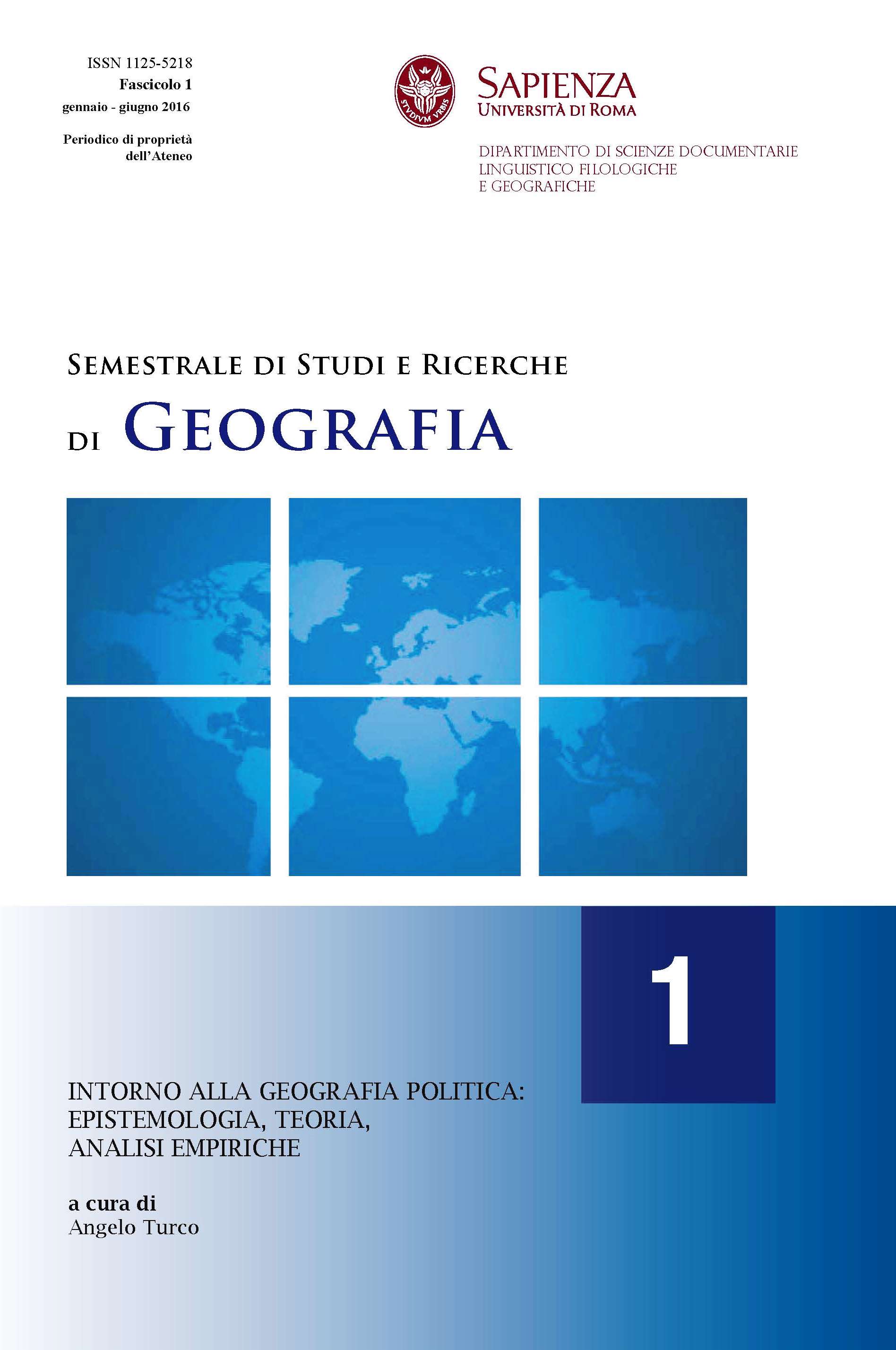Borderscaping : Estetica / Politica / Trans-territorialità. Nuove agency geografico-politiche nel Mediterraneo “oltre la linea”
DOI:
https://doi.org/10.13133/1125-5218.15069Abstract
Borderscaping: Aesthetics / Politics / Trans-territoriality.
New geographical-political agency in the Mediterranean “beyond the line”
This article discusses how rethinking borders can contribute to a critical refoundation of Political Geography. To this aim, the article proposes to rethink borders embracing the perspective of borderscaping. Specifically, the paper shows that the borderscaping approach can contribute to the refoundation of Political Geography by bringing together aesthetics and politics while relating the aesthetics-politics nexus to territoriality. In so doing, borderscaping counterpoints spatio-temporal topologies of the modern territorial imaginary and its Euclidean geometry whereas (re)affirmingthe link between a multi-dimensional territoriality of borders and politicalness. In this way, the borderscaping lens opens up the way for new geographical-political agencies.
These conceptual insights are explored referring to the Mediterranean and precisely to the Italian/Tunisian borderscape, which is investigated zooming in on the urban borderscape of Mazara del Vallo, in Sicily, and its relations with the city of Mahdia, in Tunisia. Describing the ethnographical research conducted in-between Mazara and Mahdia – including the making of a documentary film – the article presents an example of new geographical-political agency in the Mediterranean, which becomes possible “acting” on the nexus between aesthetics, politics and territoriality, or better, trans-territoriality (crossing the ontological, constitutive and configurative dimension of territoriality) as it is revealed by borderscaping.
Borderscaping: Esthétique / Politique / Trans-territorialité.
Nouvelles agentivités géographique-politiques en Méditerranée “au-delà de la ligne”
Cet article examine comment la reconceptualisation des frontières, à travers le concept de borderscaping, peut contribuer à une refondation critique de la géographie politique. Cette refondation s’appuie en particulier sur la mise en relation des notions d’esthétique et de politique et l’articulation du lien esthétique-politique avec la territorialité.
Le concept de borderscaping offre un contre-point aux topologies spatiotemporelles de l’imaginaire territorial moderne et sa géométrie euclidienne, réaffirmant le lien entre une territorialité multidimensionnelle des frontières et la nature du politique. Dans cette optique, l’approche en termes de borderscaping ouvre la voie à de nouvelles agentivités géographiques et politiques.
Ces considérations conceptuelles sont appliquées au contexte de la Méditerranée et, en particulier, au borderscape urbain constitué de Mazara del Vallo en Sicile ainsi que sur sa relation avec la ville de Mahdia en Tunisie. À partir de l’enquête ethnographique menée et qui comprends la réalisation d’un film documentaire, l’article présente un exemple des nouvelles formes d’agentivité géographique-politique en Méditerranée. Le concept de borderscaping révèle comment ces nouvelles formes d’agentivités deviennent possible à travers le lien entre l’esthétique, la politique et la territorialité, ou plus précisément, la trans-territorialité (qui concerne la dimension ontologique, constitutive et configurative de la territorialité).
##submission.downloads##
Fascicolo
Sezione
Licenza
Gli autori che pubblicano su questa rivista accettano le seguenti condizioni:- Gli autori mantengono i diritti sulla loro opera e cedono alla rivista il diritto di prima pubblicazione dell'opera, contemporaneamente licenziata sotto una Licenza Creative Commons - Attribuzione che permette ad altri di condividere l'opera indicando la paternità intellettuale e la prima pubblicazione su questa rivista.
- Gli autori possono aderire ad altri accordi di licenza non esclusiva per la distribuzione della versione dell'opera pubblicata (es. depositarla in un archivio istituzionale o pubblicarla in una monografia), a patto di indicare che la prima pubblicazione è avvenuta su questa rivista.
- Gli autori possono diffondere la loro opera online (es. in repository istituzionali o nel loro sito web) prima e durante il processo di submission, poiché può portare a scambi produttivi e aumentare le citazioni dell'opera pubblicata (Vedi The Effect of Open Access).


